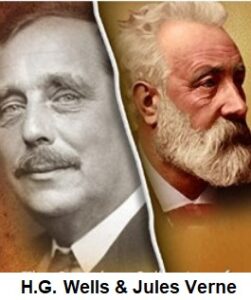Links to the works by various Sci-Fi authors covered in this section:
Books Short Stories
Note: The lists in this section do not include books by Isaac Asimov and Arthur C. Clarke, which can be found in their own separate sections.
 Commentary:
Commentary:
It is interesting to note that Frankenstein, which could be called the first science-fiction novel ever, was written by a 20-year-old, Mary Shelley, with no science background but with the apparent encouragement (and sometimes condescension) of her husband Percy Shelley, the famous poet. However, the Sci-Fi genre did not really take off until nearly half a century later, when the French writer Jules Verne entered the scene.
Verne was a master of science fiction, virtually creating the genre from scratch and making it wildly popular. He was a true visionary, and many of his ideas (such as airplanes, submarines and rockets) became a reality long after his death. Among his famous works are Twenty Thousand Leagues Under the Sea, From the Earth to the Moon, A Journey to the Center of the Earth and Off on a Comet.
Verne was followed by the British writer H.G. Wells, who wrote many popular science-fiction stories including The Time Machine, The Invisible Man and The War of the Worlds. Wells carried the baton until a new group of Sci-Fi writers emerged in the 1920s and 1930s.
In the beginning, these new entrants to the world of science fiction mostly published their work in pulp magazines which also included other subject matter that was lurid and sensational. By the late 1930s, however, Sci-Fi emerged as a more respectable form of writing, and the quality of the stories took a giant leap forward. Along with Isaac Asimov and Arthur C. Clarke (covered in their own section), many other Sci-Fi writers emerged in the 1940s and 1950s, including Robert A. Heinlein and Ray Bradbury.
Around this time, the Sci-Fi genre started to encompass dystopian novels which had a higher level of literary quality than the typical Sci-Fi novel. Some examples of this are Brave New World, Nineteen Eighty-Four and Fahrenheit 451. This trend started to accelerate in the 1960s and beyond, and these days dystopian stories constitute a large portion of science-fiction works. I am not a big fan of dystopian novels, so my interest in modern Sci-Fi novels has dwindled significantly. I much prefer digging into the rich variety of science fiction from the middle of the twentieth century and never cease to be amazed by the soaring imagination of these incredible writers.
